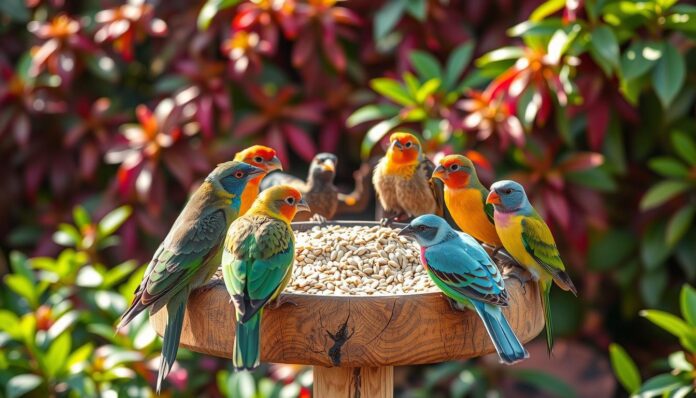Can Birds Eat Flax Seeds
Did you know flax seeds are great for birds? They’re full of omega-3 fatty acids, fiber, and antioxidants. They also have important vitamins and minerals. But can birds eat flax seeds safely? This guide will help you know how to add them to your bird’s diet.
As a bird owner, you want the best for your bird. Flax seeds are a good choice because they’re nutritious. But, you need to know how to give them to your bird safely.
Understanding Flax Seeds as a Nutritional Source
Flax seeds are a nutritional powerhouse for birds. They are full of essential fatty acids, protein, and fiber. These tiny seeds are great for your bird’s diet.
Flax seeds are rich in alpha-linolenic acid (ALA), an omega-3 fatty acid. This acid helps keep the heart healthy and reduces inflammation in birds.
Essential Nutrients in Flax Seeds
Flax seeds are a good source of plant-based protein. They provide essential amino acids for muscle growth and health. The high fiber content helps with digestion, preventing digestive issues in birds.
Flax seeds also have vitamins and minerals like B vitamins, copper, and manganese. These nutrients boost energy, brain function, and overall health in birds.
Health Benefits for Birds
Adding flax seeds to your bird’s diet can greatly improve its health and appearance. The omega-3 fatty acids in flax seeds make the skin and feathers healthy and shiny. The antioxidants in flax seeds also support a strong immune system, reducing the risk of health problems.
Natural Sources of Omega-3
For birds that don’t eat nuts, flax seeds are a healthier option for omega-3 fatty acids. Adding flax seeds a few times a week ensures your bird gets the nutrients it needs for heart, brain, and overall health.
Flax seeds are a nutritious addition to your bird’s diet, providing many health benefits. Understanding their nutritional value helps you make choices that support your bird’s well-being and longevity.
Can Birds Eat Flax Seeds: Safety and Preparation Methods
Feeding your birds safely is very important. Flax seeds can be good for them, but you need to prepare them right. Let’s look at how to safely add flax seeds to your bird’s food.
Flax seeds are safe seeds for birds for birds if you prepare them right. Grinding or soaking them makes them easier to digest. Whole seeds might not be digested and won’t give much nutrition.
- Grind or crush the flax seeds to a fine powder before giving them to your bird.
- Soak the seeds in water for a few hours to make them softer and easier to digest.
- Always give fresh, high-quality flax seeds. Avoid old or spoiled ones, as they can harm your bird.
When adding new foods, do it slowly and watch your bird. Look at how they eat, their droppings, and their behavior. This helps make sure they like the flax seeds and get the health benefits.
| Nutrient | Flax Seeds | Chia Seeds | Sunflower Seeds |
|---|---|---|---|
| Omega-3 Fatty Acids | High | Moderate | Low |
| Protein | Moderate | High | High |
| Fiber | High | High | Moderate |
| Calcium | Moderate | High | Moderate |
By following these safe steps and watching your bird, you can add flax seeds to their diet. This gives them the nutrients they need to stay healthy. Remember, a mix of safe seeds for birds, fresh fruits, and other bird foods is important for pet bird care and bird food preparation.
You May Like:- Can Fleas Go on a Bird? What Pet Owners Need to Know
Incorporating Flax Seeds into Your Bird’s Diet
Adding flax seeds to your bird’s diet can be very beneficial. But, it’s key to keep the amount small. Flax seeds should only be a small part of what your bird eats.
Recommended Serving Sizes
Try to keep flax seeds under 10% of your bird’s daily food. This helps avoid too many calories, which can cause weight gain.
Frequency of Feeding
Give flax seeds to your bird 2-3 times a week. This keeps their diet balanced and healthy.
Mix-in Suggestions
- Mix ground flax seeds into fresh veggies or greens for extra nutrition.
- Sprinkle whole flax seeds over other food items as a treat.
- Add flax seeds to bird seed mixes for a tasty, balanced meal.
A good pet bird care plan includes quality pellets, fresh fruits and veggies, and less seed. Adding flax seeds wisely supports your bird’s health and happiness.
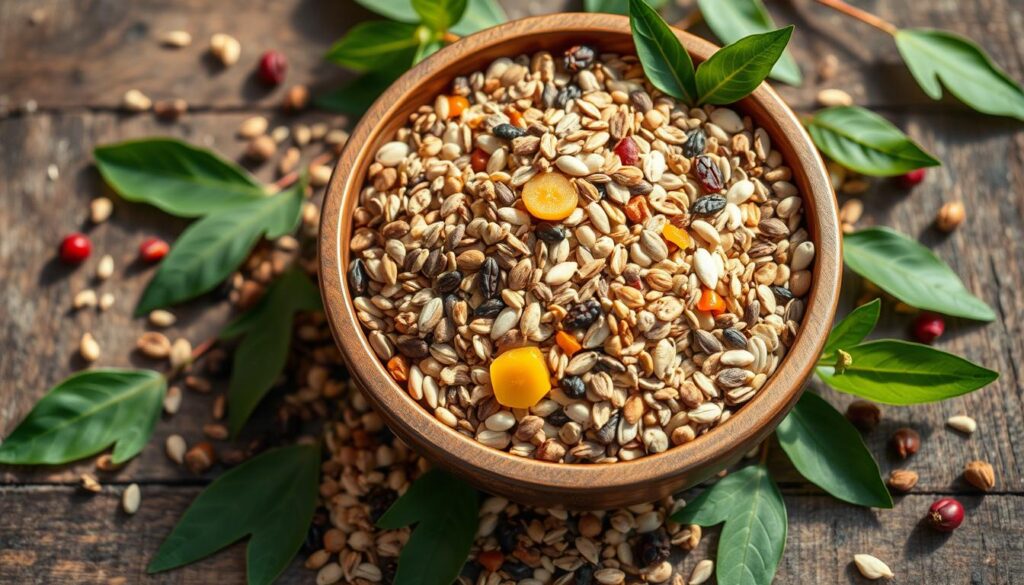
Different Bird Species and Their Flax Seed Needs
Adding flax seeds to your bird’s diet is important. Different birds need different amounts of flax seeds. Larger birds like macaws and cockatoos might need more because they burn more fat.
Smaller birds, like finches and budgies, might only need a little bit. It’s all about what each bird needs to stay healthy.
African Grey parrots might need more calcium, which flax seeds don’t have much of. So, it’s key to make sure your bird gets the right mix of food. Talking to an expert, like Patty Jourgensen, can help make sure your bird gets the best nutrition.
| Bird Species | Flax Seed Needs | Nutritional Considerations |
|---|---|---|
| Macaws and Cockatoos | Higher | Increased fat requirements |
| Finches and Budgies | Lower | Smaller serving sizes needed |
| African Greys | Moderate | May require additional calcium |
The right amount of flax seeds for your bird depends on their needs and species. By adjusting their diet, you can help them get the most from flax seeds and stay healthy.
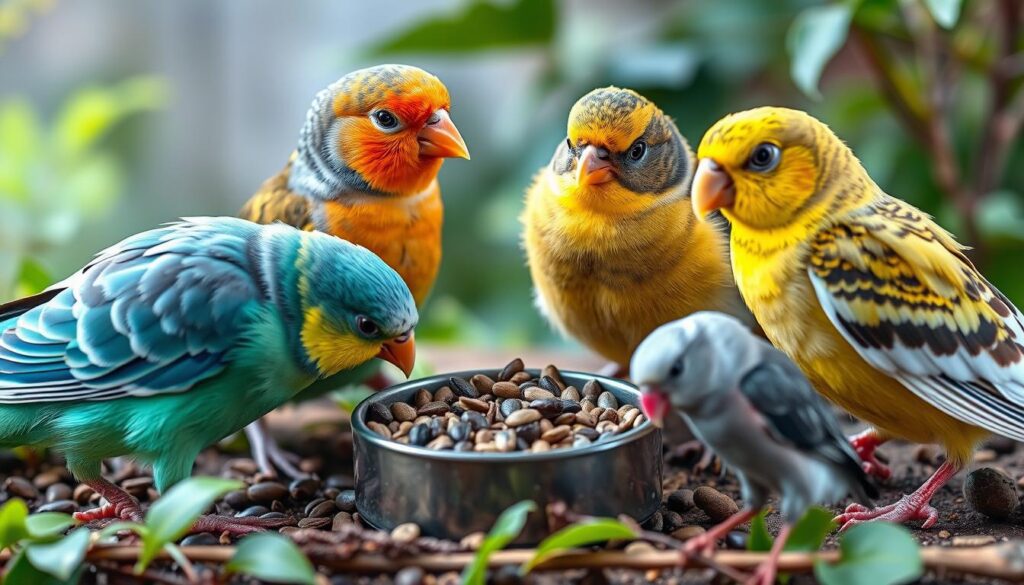
Signs Your Bird Benefits from Flax Seeds
Adding flax seeds to your bird’s diet can be very beneficial. You can see the positive effects by watching how your bird looks and acts. This shows that flax seeds are good for them.
Physical Health Indicators
One clear sign is if your bird’s feathers look better. They might be brighter and shinier. This means their feathers are healthier and they have more energy.
Behavioral Changes
Flax seeds can also change how your bird behaves. They might start to explore more and play more. This shows they are happy and healthy.
But, watch out for any signs of trouble. Like if they have tummy issues or their poop changes. It’s key to keep an eye on their health and talk to a vet regularly.
By watching your bird closely, you can tell if flax seeds are helping. They will show you in their looks and actions. This is good for their bird nutrition, pet bird care, and avian health.
Potential Risks and Precautions
Flax seeds are usually safe for birds, but we must watch out for risks. Too much flax seed can cause obesity or unbalanced nutrition. Some birds might find it hard to digest whole seeds, which could be a choking hazard.
Start adding flax seeds slowly to your bird’s diet. Keep an eye out for any signs of allergies or stomach problems. Also, make sure the flax seeds are fresh and not spoiled to avoid health issues.
- Avoid overfeeding flax seeds to prevent obesity and nutritional imbalances
- Some birds may struggle to digest whole flax seeds, increasing the risk of choking
- Introduce new foods slowly and observe your bird’s response for any adverse reactions
- Ensure proper storage and freshness of flax seeds to prevent health issues from rancid or spoiled seeds
By being careful, you can add flax seeds safely to your bird’s diet. This will help them stay healthy and happy.
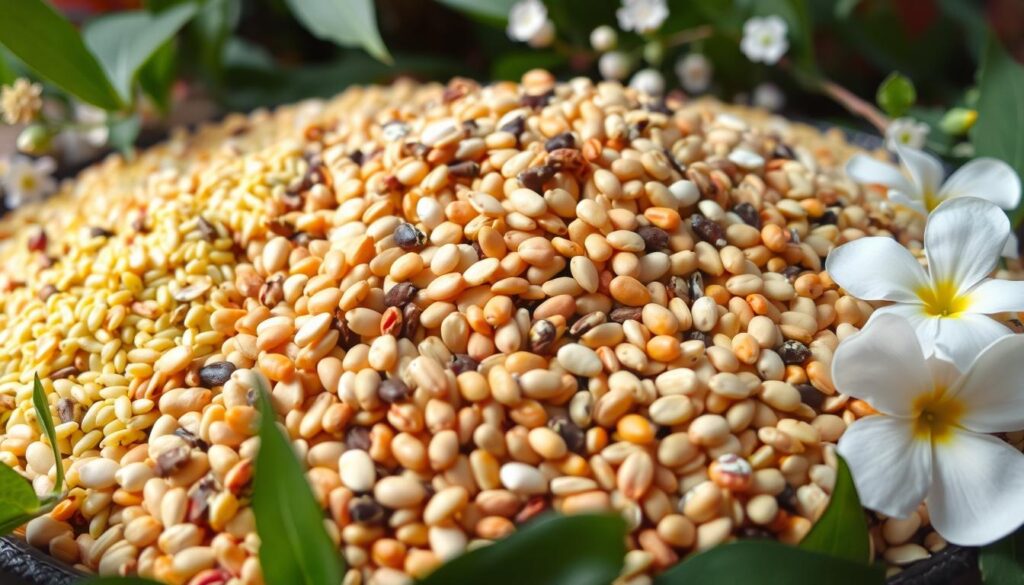
For a bird to be healthy and happy, they need a varied diet. Talk to an avian vet or trusted bird care sources. This way, you can make sure you’re giving your bird the best care.
Alternative Seed Options for Birds
As bird owners, it’s key to know about different seed options. These can help give your birds a balanced diet. While flax seeds are good, other seeds can also be great for your birds.
Comparing Nutritional Values
Chia seeds are packed with calcium, which is great for birds. Hemp seeds have good fats for health and shiny feathers. Pumpkin seeds are full of vitamins and antioxidants, helping your bird stay healthy.
Seed Rotation Strategies
Switching up seeds keeps your bird’s diet interesting and full of nutrients. Different seeds meet the needs of different birds. But remember, seeds should not be the main part of their diet. They are too fatty and lack some important nutrients found in fruits and veggies.
| Seed Type | Nutritional Highlights | Preferred Bird Species |
|---|---|---|
| Chia Seeds | High in calcium, fiber, and antioxidants | Parrots, cockatoos, conures |
| Hemp Seeds | Balanced omega-3 and omega-6 fatty acids | Cockatoos, macaws, cockatiel |
| Pumpkin Seeds | Rich in vitamins, minerals, and antioxidants | Parrots, macaws, cockatoos |
By mixing up bird seed mixes and changing seeds, you can give your bird a diet full of nutrients. This helps keep them healthy and happy.
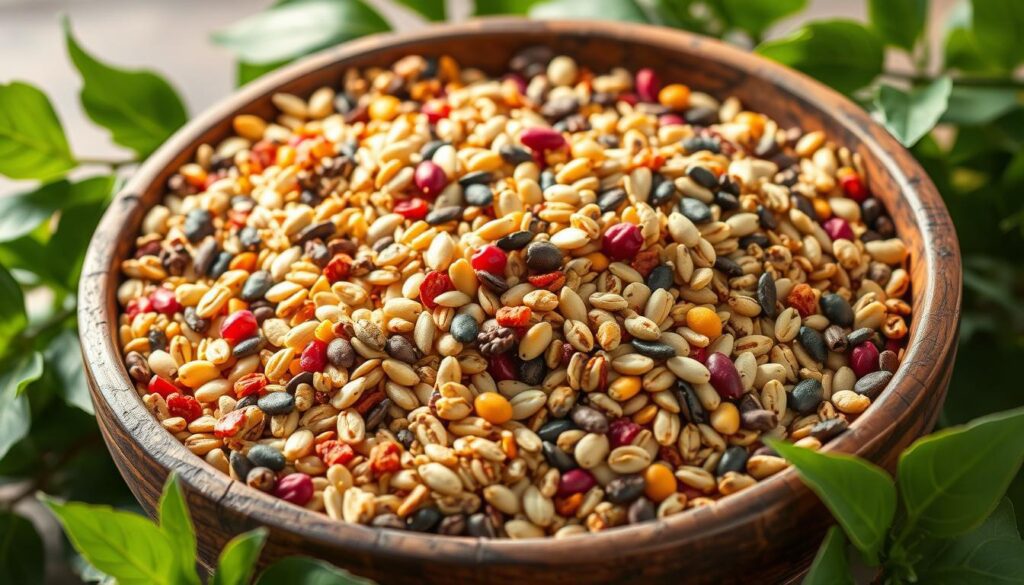
Best Practices for Storage and Freshness
Keeping your bird’s food fresh is key. For bird food storage, store flax seeds in an airtight container in a cool, dark spot. This prevents rancidity. Refrigeration can also keep your avian diet items fresh longer.
Ground flax seeds should be used within a week because they lose potency fast. Whole flax seeds, though, can last months if stored right. Always check for spoilage before feeding your pet bird. If seeds smell bad or have mold, throw them out to keep your bird safe.
- Store flax seeds in an airtight container in a cool, dark place
- Refrigerate to extend shelf life
- Use ground flax seeds within a week
- Whole flax seeds can last several months
- Check for signs of rancidity or mold before feeding
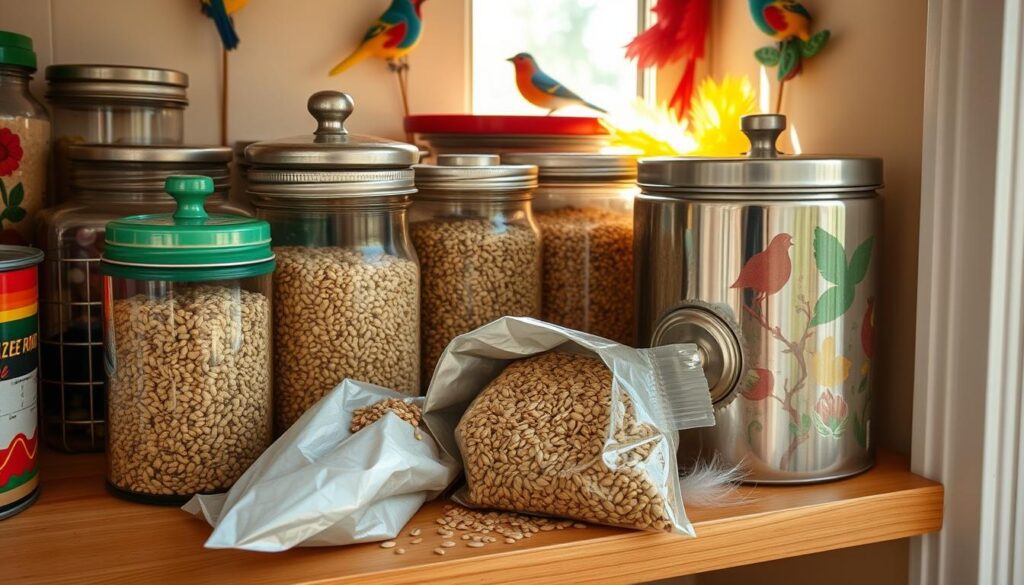
By following these tips, you keep your bird’s food fresh and full of nutrients. Good bird’s food quality is vital for their health and happiness.
Creating a Balanced Diet with Seeds and Fresh Foods
As a bird owner, it’s key to give your feathered friend a balanced diet. Pellets are a good start, but adding fresh foods and seeds like flax is also important. These additions bring lots of bird nutrition and avian diet benefits.
Pellets are full of essential nutrients, but they shouldn’t be all your bird eats. Add dark leafy greens, colorful veggies, and a bit of fresh fruit. Some birds might also enjoy cooked lean meats or eggs for extra protein.
Seeds are tasty, but don’t let them be the main part of your bird’s diet. Flax seeds, for example, are packed with omega-3 fatty acids and other good stuff. Always check with an avian veterinarian to see how much and how often to give them to your bird.
By mixing fresh foods and the right seeds, you can make sure your bird is happy and healthy. Every bird is different, so talk to your vet to create a diet plan that’s just right for your feathered friend.
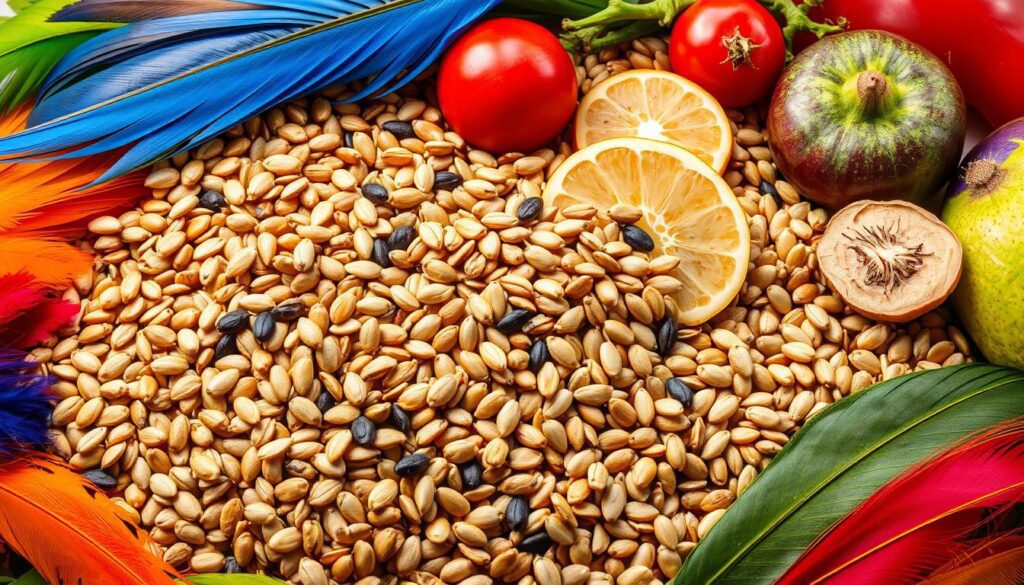
Conclusion
Flax seeds can be great for your bird’s diet, adding essential fatty acids and nutrients. But, it’s key to know what your bird needs and mix flax seeds into a balanced diet. Every bird is different, so talking to a vet is a good idea to find the right food plan.
Start with a little bit of flax seeds and watch how your bird reacts. Look for any changes in how they feel or act. This will tell you if flax seeds are good for them. Also, make sure to store and prepare the seeds properly to keep them fresh and safe.
In the end, can birds eat flax seeds is a yes, but do it carefully and in small amounts. By focusing on your bird’s avian diet and bird nutrition, you can keep them happy and healthy.
FAQ
Can birds eat flax seeds?
Flax seeds can be good for birds if given in small amounts. They are full of omega-3 fatty acids, fiber, and lignans. But, it’s key to prepare them right and not overfeed. Always check with a vet before adding new foods to your bird’s diet.
What are the benefits of flax seeds for birds?
Flax seeds are packed with good fats, protein, and fiber. They have a lot of alpha-linolenic acid (ALA), which is great for the heart and reduces inflammation. For birds, they can help with better feathers, stronger immune systems, and overall health.
How should flax seeds be prepared for birds?
Flax seeds are safe for birds when prepared correctly. Grinding or soaking them makes them easier to digest. Whole seeds might not get digested. Always give fresh seeds and avoid rancid ones, which can harm your bird.
How much flax seed should I feed my bird?
Flax seeds should only be a small part of a bird’s diet, about 10% of their daily food. Offer them 2-3 times a week. Mix ground flax seeds into veggies or sprinkle them on other foods. Some birds might like whole seeds as treats.
Are there any species-specific considerations for feeding flax seeds to birds?
Different birds need different foods. Big parrots like macaws and cockatoos might need more flax seeds because they need more fat. Smaller birds like finches and budgies should get less. Some birds, like African Greys, might need more calcium, which flax seeds don’t have much of.
How can I tell if my bird is benefiting from flax seeds?
If your bird’s feathers look better, their plumage is brighter, and they have more energy, it’s a good sign. They might also seem more interested in foraging and playing. But watch for any signs of digestive problems or changes in their droppings.
Are there any risks or precautions to consider when feeding flax seeds to birds?
While flax seeds are mostly safe, too much can cause obesity or imbalance in their diet. Some birds might have trouble digesting whole seeds. There’s a risk of choking if they eat too many whole seeds. Also, bad seeds can harm your bird, so keep them fresh.
What other healthy seed options are there for birds?
Healthy options include chia seeds, hemp seeds, and pumpkin seeds. Each has its own benefits. Chia seeds are high in calcium, and hemp seeds have good fats. Mixing up the seeds keeps your bird’s diet interesting and balanced.
How should I store flax seeds to keep them fresh?
Keep flax seeds in a sealed container in a cool, dark place to prevent them from going bad. Refrigeration can help them last longer. Ground flax seeds should be used within a week, while whole seeds can last months. Always check for spoilage before feeding.
How can I create a balanced diet for my bird with seeds and other foods?
A balanced diet for birds should include a variety of foods. Pellets are a base, with fresh fruits and veggies added. Seeds, like flax, should be given in small amounts. Dark leafy greens, colorful veggies, and a little fruit are key for vitamins and minerals. Some birds might also enjoy lean meats or eggs for protein.


